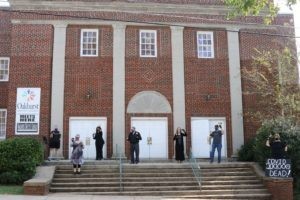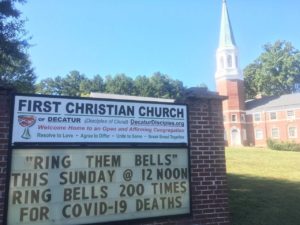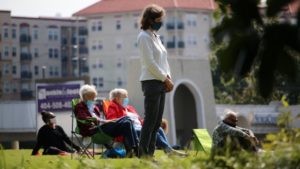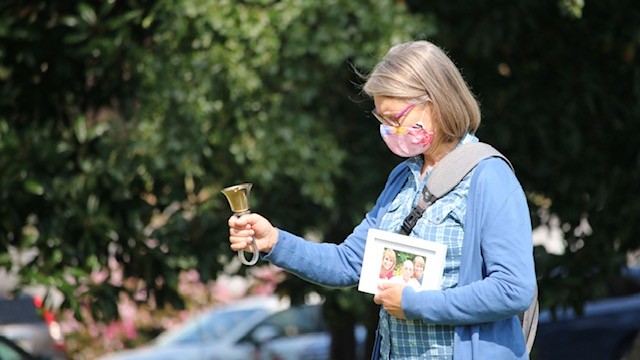Religious leaders in Decatur, Ga., who recently staged an interfaith memorial for the victims of COVID-19 say the experience was emotionally and spiritually healing and demonstrates the need for mourning collectively.
“There is something powerful about sharing grief in a ritualized way with one another,” said Melanie Vaugh-West, pastor of Oakhurst Baptist Church.
Oakhurst was one of about 15 downtown Decatur churches who were joined by members of the Baha’i, Hindu and Sikh communities, to ring steeple bells, hand bells or both 200 times on Oct. 4 to commemorate 200,000 U.S. COVID-19 deaths and 1 million worldwide. Those numbers have since increased.

Members of Oakhurst Baptist Church in Decatur, Ga., ring bells in memory of those lost to COVID-19. (Photo/Lynn Farmer)
Participants gathered on church lawns or sidewalks and were socially distanced. Ministers reported pedestrians and drivers stopping to listen.
“We are kind of wired for collective, ritualized grieving,” Vaughn-West said. “It is a deep need to be seen in our grief.”
A memorial was necessary to recognize that some churches have lost members to the coronavirus while many other congregants have lost friends and relatives to the disease, said David Jordan, senior pastor at First Baptist Church.
Public grieving had been delayed, he added, by the fact that clergy and congregations remain physically separated because of social distancing.
“This is a national tragedy, but we haven’t had the forum to talk about it,” Jordan said. “We just needed to stop for a second and say, ‘This is a national tragedy.’ We just need to recognize that.”
Because it has a large lawn, First Baptist welcomed the Baha’i, Hindus and Sikhs to its property to participate in the commemoration. The church’s steeple bell chimed 200 times, each ring representing 1,000 U.S. victims. The bell rang every 15 seconds, which took 50 minutes.

A church in Decatur, Ga., invites the community to commemorate those have died from COVID-19. (Photo/James Brewer-Calvert)
“That long stretch forced you to think about and meditate on what’s going on and who we have lost,” Jordan said. “Every toll also stood for 1,000 families who had lost a loved one and 1,000 communities who were grieving.”
The idea originated with Ernie Campbell, a member and deacon at First Baptist who recently learned that a friend in Savannah, Ga., had contracted COVID-19.
“When I called to check on him, I was informed he had passed away, and that really pushed me to just try and do something,” he said.
Campbell shared the idea of ringing bells with Jordan. “I said we (the church) cannot just stand on this corner and be silent.”
Listening to the tolling of the bells evoked poignant prayers for his friend in Savannah and all struck down by the virus. It also reminded him of the ineffective public policies that enabled the continued spread of the disease.
“This is unusual. This is not normal what is occurring,” Campbell said. “You don’t have 200,000-plus people dying just for the sake of dying when it can be prevented.”
The sound of nearby and distant bells wafting through downtown was a powerful emotional experience, said James Brewer-Calvert, senior pastor at First Christian Church.
“I got choked up,” he said. “We have had four people in my congregation who have died from COVID-19,” adding that he also lost a close friend to the disease.
Brewer-Calvert said he was pained reflecting on the insufficient federal and state responses to the pandemic. “You feel the loss in all of this. That’s part of the tragedy of it — that it didn’t have to be.”
 The bell-ringing memorial helped people process these challenging emotions that often go unrecognized.
The bell-ringing memorial helped people process these challenging emotions that often go unrecognized.
“Grief is good. Grief is a gift from God. Grief connects us with the holy. Grief helps us to memorialize and remember those who have gone on before us and the connections we have had,” Brewer-Calvert said.
Working together on the memorial had the added effect of adding to the kinship between the churches and the other faith groups that participated, Jordan said.
Oct. 4 was the scheduled date of the event because it was World Communion Sunday on the Christian calendar, which helped connect the memorial to the pandemic worldwide.
And for many, it was the first time they had physically gathered — in a socially distanced manner — as a church since the beginning of the pandemic, Jordan said. “It was a time of grief, but it almost had a festive air to it.”
Vaughn-West said individuals can create their own community memorials by gathering in online or socially distanced spaces.
“Light a candle, ring bells or even drumming can be helpful,” she said. “And tell stories. Talk about the experience of going through this as individuals and as a community. There are a lot of ways we can create space for corporate grief.”

